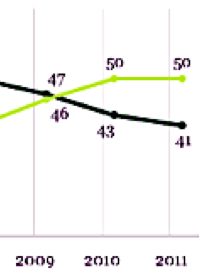
Despite years of climate change hype promoted by the media and environmental extremists, a new Gallup poll provides further evidence that the percentage of Americans who do not believe in manmade global warming continues to rise. Furthermore, the public recognizes that implementing the environmentalist agenda is deleterious to the economy, and are unwilling to see further damage inflicted on the U.S. economy to implement programs of dubious merit.
As Lydia Saad wrote for Gallup.com: “Americans, by 50% to 41%, say the nation should prioritize the development of energy supplies over protecting the environment when the two goals are at odds. This reflects the continuation of a striking reversal of attitudes compared with those seen from 2001 through 2008, when Americans showed a clear preference for environmental protection.”
When it comes to a choice between the economy and the environment, the priorities of the American people are essentially a complete reversal the relative levels of public opinion in 2002: In 2002, 52 percent placed the priority on the environment, “even at the risk of limiting U.S. energy production,” while 40 percent prioritized expanded energy production, “even if the environment suffers to some extent.” Not surprisingly, the 2011 poll results are consistent with a steady trend since 2007, when support for the environmentalist agenda without regard for its economic impact reached its apex at 58 percent. The steady, downward trend (50 percent in 2008; 47 percent in 2009, and 43 percent last year) has coincided with the Bush/Obama recession, soaring fuel costs and the “Climategate” and “Glaciergate” scandals which severely damaged the credibility of the argument for anthropogenic climate change. The degeneration of the UN Climate Change Conference in Copenhagen in December 2009 into a squabble among third world nations over the redistribution of wealth from the developed nations also contributed to a decline in the number of Americans willing to accept the premises behind the UN’s agenda.
Not only are Americans less willing to endure higher energy costs, an increasing number of them simply do not believe that climate change is actually taking place. According to a story for the AFP:
The number of Americans who are worried about global warming has fallen to nearly the historic low reached in 1998, a poll released Monday showed.
Just 51 percent of Americans — or one percentage point more than in 1998 — said they worry a great deal or fair amount about climate change, Gallup’s annual environment poll says.In 2008, a year after former US vice president Al Gore and the UN Intergovernmental Panel on Climate Change won the Nobel Peace Prize, two-thirds of Americans were concerned about climate change.
The rate of concern among Americans has fallen steadily since then to 60 percent in 2009 and 52 percent last year.The poll also found that for the first time since the late 1990s, a minority of Americans — 49 percent — believe global warming has already begun to impact the planet, down sharply from more than six in 10 Americans who three years ago said climate change was already impacting the globe.
“The reasons for the decline in concern are not obvious, though the economic downturn could be a factor,” Gallup analysts say, citing a poll from two years ago that shows that in the minds of Americans, economy takes precedence over environment.
Certainly the loss of millions of jobs and gas prices which have occasionally jumped into the neighborhood of four dollars a gallon has a tendency to “sober up” that portion of the public opinion which would otherwise simply concede the claims of environmentalists. In fact, there has been a steady increase since 2007 in the number of Americans who favor expanded production of energy over conservation. Again, 2007 was the apex of those who favor “more conservation by consumers of existing energy supplies (64 percent) over those who supported “production of more oil, gas and coal supplies” (26 percent). The “conservation” emphasis has steadily dropped each year (61 percent in 2008, 52 percent last year, and 48 percent currently), even as the support for more energy production has risen (29 percent in 2008, 36 percent last year and 41 percent at present).
If current trends in public opinion continue from now through 2012, expanded energy production will be an even more influential issue in the national elections than it was in 2008 and 2010. The heavy dose of reality dolled out by a recession at home and revolutions in many of the world’s oil producing nations has a way of dispelling environmentalist threats which now appear to have been either inflated or illusory.
Key to chart above: Dark green line: % who prioritize protection of the environment, even at the risk of U.S. energy production
Light green line: % who prioritize development of U.S. energy supplies, even if the environment suffers to some extent



